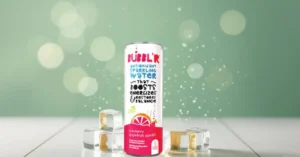Coffee mate is a well-known creamer that many use to enhance the taste of their morning coffee. However, it has been banned in some countries due to concerns over its ingredients, which are considered harmful to human health. The main issue lies with the presence of hydrogenated oil and trans fats, which have been linked to an increased risk of serious health issues such as heart disease and obesity.
These ingredients can contribute to the buildup of bad cholesterol, leading to long-term health problems. As a result, some countries have decided to remove it from their shelves. Studies have shown that this growing concern has led to a class action lawsuit against the product. It’s also no surprise that vegans aren’t too impressed with the creamer, as it doesn’t align with their dietary preferences.
Despite being so ubiquitous, the product has raised questions about whether Coffee mate is the villain it’s sometimes made out to be. Beneath its innocent facade, there are whispers of hidden dangers that continue to brew, sparking debates about its overall impact on health.
Banned Ingredients in Coffee Mate
Coffee Mate, a popular coffee creamer manufactured by Nestle, has been banned in several countries due to its harmful ingredients.
Coffee-Mate Ban Facts!
Harmful Ingredients in Coffee Mate
One of the key issues with this product is the inclusion of hydrogenated oil, also known as hydrogenated vegetable oil. This oil is created by adding hydrogen to vegetable oil, which changes it into a solid form. While it is used in many food products to improve texture and shelf life, it contains trans fat, which the Mayo Clinic warns is the worst type of fat a person can consume.
Health Impacts of Trans Fats
Countries like Austria, Hungary, Norway, Denmark, and Iceland have banned Coffee Mate because of the negative effects trans fat has on human health. Trans fats are known to increase bad cholesterol levels while lowering good cholesterol, leading to serious health problems like heart disease.
Additional Harmful Ingredients
In addition to hydrogenated oil, Coffee Mate also contains partially hydrogenated soybean and cottonseed oils, which are other sources of trans fats and have been linked to heart disease. To extend the shelf life of the product, preservatives like BHA and BHT are also included. These ingredients, along with the presence of hydrogenated oils, have raised concerns over human health and prompted countries to protect their citizens by removing Coffee Mate from their markets.
Countries Where Coffee Mate is Banned

Coffee Mate is banned in several European countries due to its trans fat content.
Notably, Switzerland, Austria, Hungary, Denmark, Norway, and Iceland have banned Coffee Mate products. These bans are in place because the product’s formulation, particularly its high levels of partially hydrogenated oils (trans fats), does not comply with the stricter food safety regulations concerning trans fat limits in these nations.
Trans fats are widely recognized as contributing to an increased risk of heart disease and other adverse health effects.
While Coffee Mate remains available in many parts of the world, including the United States, its ingredients profile has led to its restriction in countries with more stringent dietary fat regulations. This highlights differing approaches to food ingredient standards across various regions.
Countries Enforcing the Ban
In Denmark, Austria, Norway, Iceland, and Hungary, the government has implemented strict measures to ensure that trans fats are not included in any food products, aiming to improve public health. Similarly, Switzerland has also banned Coffee Mate due to these health risks.
European Union and Other Countries
The European Union took action in 2021, imposing a ban across all EU member states to prevent the sale of the product within its borders. However, Coffee Mate remains available in other countries like Japan and the United Kingdom. Despite its popularity, these nations have taken a step towards reducing health risks related to trans fats by removing the product from the shelves.
Health Concerns Associated with Coffee Mate
Coffee Mate, a popular creamer used to enhance the flavor of coffee, has raised several health concerns. One of the main issues is its use of vegetable oil, which contains linoleic acid. This substance has been linked to various health problems such as coronary heart disease, diabetes, obesity, and even asthma.
Additionally, the product contains trans fat, which can increase bad cholesterol and lower good cholesterol, putting individuals at a higher risk for serious conditions like heart disease, heart attack, and stroke.
Countries like Austria, Hungary, Norway, Denmark, and Iceland have taken action and banned Coffee Mate due to these risks. Although there are rumors about Coffee Mate being carcinogenic, there is no solid scientific evidence to back this up. However, some people report adverse effects like itching or hives after consuming the product.
If you’re concerned about the health effects of Coffee Mate, you may want to consider switching to a different creamer or simply enjoy black coffee.
Is Coffee Mate Bad for You?
When you look at the ingredient label of Coffee Mate, it’s clear that the product contains some controversial ingredients. Among its three main ingredients, you’ll find corn syrup solids, hydrogenated vegetable oil, and sodium caseinate, which is a milk derivative.
These ingredients are not the best for your health, as hydrogenated vegetable oil includes trans fat, which has been linked to several health concerns.
Although Coffee Mate may not be classified as “bad” for everyone, the presence of trans fat in such a small amount can still have negative effects, especially over time. With ingredients like corn syrup solids and sodium caseinate, it’s important to consider how often you’re consuming it, as these may not be the healthiest options in the long run.
Whether you’re concerned about your health or just looking for a better alternative, it’s worth considering the impact of these ingredients.
A Trans Fat Scandal Led to Coffee Mate’s Ban
In 2018, Coffee Mate faced a class action lawsuit that accused it of containing unhealthy trans fats, even though the product label claimed otherwise. It turned out that manufacturers in the U.S. had found a loophole: as long as the serving size contained 0.5 grams or less of trans fats, they could legally label the product as trans fat-free.
Since Coffee Mate’s recommended serving size is just 1 tablespoon, it was able to get away with its zero dodgy fats claims. But in 2020, the court rejected Nestlé’s attempt to dismiss the lawsuit, bringing more scrutiny to the brand’s marketing tactics.
Despite the controversy surrounding the product’s fats, Coffee Mate’s nutritional profile paints a less-than-ideal picture. With artificial additives, minimal fiber, protein, vitamins, and minerals, it offers little nutritional value.
On top of that, the fats and sugar that make Coffee Mate so tasty have been linked to weight gain and an increased risk of obesity. The product’s poor nutritional quality and excessive consumption make it less than optimal for those seeking a healthy morning boost.
Why Is Coffee Mate Banned in Some Countries?
The main reason Coffee Mate is banned in several countries is because it contains trans fats. These harmful fats are found in the partially hydrogenated oils used to make the product smooth and shelf-stable. However, these fats are linked to serious health problems like heart disease, cancer, Alzheimer’s disease, and Type 2 diabetes.
Countries in Europe have much stricter food safety laws than the U.S., and in 2013, the European Union set a limit of 2 grams of trans fat per 100 grams of fat in food products. Since Coffee Mate often exceeds this limit, it has been banned in countries like Denmark, Iceland, Norway, and Switzerland.
In Europe, Coffee Mate is specifically banned in its liquid form due to the hydrogenated vegetable oil it contains, which adds trans fats. This decision to disallow the sale of the liquid version is driven by the need to protect public health. However, Coffee Mate is still available in a powdered form, which does not contain these harmful trans fats, allowing some versions of the product to still be sold in the EU.
Vegan Concerns Around Coffee Mate
While Coffee Mate claims to be a non-dairy product, it contains milk-derived proteins like sodium caseinate, which makes it unsuitable for people following a vegan lifestyle. This lack of transparency has been frustrating for many health-conscious consumers who expect clearer labeling.
In 2022, Nestlé tried to address this issue by launching vegan-friendly options under the Coffee Mate label. These products, aimed at providing a plant-based alternative, marked the first time the brand offered plant-based creamers in this category, joining the already available Natural Bliss non-dairy products in the U.S.
Healthier Alternatives to Coffee Mate: What You Should Know

Regulated Alternatives Around the World
If you’re seeking a healthier option to Coffee Mate, there are plenty of alternative products available, regulated differently around the world. Some of these options have been banned in certain countries due to specific ingredients or limits on substances like saturated fat.
For example, fat-free creamers made from skim milk or low-fat dairy are common alternatives. These products are widely available, but rBST and rBGH hormones are permitted in the United States, while they are banned in Europe.
Powdered and Liquid Creamers
Another popular option is powdered creamer, typically made with a blend of sugar, corn syrup solids, and partially hydrogenated soybean oil. While some countries have banned the use of partially hydrogenated oils, it remains permitted in others. Liquid creamer, which includes milk, cream, and sugar, can be found as well.
In some regions, it is considered a dairy product, while in others, it’s treated as a food additive. Recently, coconut oil, derived from the meat of coconuts, has gained popularity due to its saturated fat content. However, regulations on the amount of saturated fat allowed in food products vary across countries.
Plant-Based and Natural Alternatives
If you’re looking for something a bit different, consider unsweetened oat, coconut milk, or almond milk. These are often fortified with essential nutrients, providing a delicious and nutritious way to customize your coffee. These eco-friendly plant milks are a great option for those following vegan principles and are a better alternative to many traditional creamers.
Additionally, natural sweeteners like maple syrup can help create a more balanced coffee experience. Always read the labels carefully to ensure you are purchasing the right product for your dietary needs and maintaining a healthy lifestyle. Knowledge is the key to making the best decisions about what goes into your coffee and your body.
- Does NOS Energy Drink Have Caffeine? Expert Guide (2025)
- Does Bubbl’r Sparkling Water Have Caffeine? Full Breakdown In 2025
- Does Elderberry Energy Drink Contain Caffeine? Complete 2025 Review
Conclusion
Coffee Mate has faced scrutiny in many countries due to concerns about its ingredients and their potential health risks. From the presence of trans fats and artificial additives to its lack of transparency regarding vegan claims, the product’s regulatory challenges are significant. As a result, Coffee Mate has been banned or heavily regulated in several regions, including parts of Europe, where stricter food safety laws are in place.
However, alternative options like vegan-friendly creamers, fat-free options, and natural alternatives continue to grow in popularity for those seeking a healthier, more transparent option for their coffee. Whether you’re avoiding specific ingredients or looking for a more eco-friendly choice, understanding these regulations can help you make informed decisions about what goes into your body.
FAQs
Is coffee creamer banned in the UK?
Several countries, including the UK, have discouraged the sale of some non-dairy coffee creamers due to the presence of partially hydrogenated oils or trans fats. While not a complete ban, these measures reflect growing health concerns over such ingredients.
How unhealthy is Coffee-Mate?
Many consumers have raised concerns over Coffee Mate due to its artificial components and chemical additives, which may pose health risks if consumed regularly over time. While the product isn’t necessarily harmful when consumed in moderation, the inclusion of certain substances should be carefully considered. This criticism stems from growing awareness of the potential dangers linked with long-term use, urging people to be mindful of the substances they consume.
Is mate worse than coffee?
It’s important to highlight that the positive effect of yerba mate is quite different from coffee. While coffee is highly acidic and can cause issues like ulcers, IBS, gastritis, acid reflux, and even Crohn’s disease, yerba mate is digestive-friendly and actually promotes good digestive health. This makes yerba mate a gentler alternative for those who are concerned about their digestive well-being.
What is the benefit of coffee mate?
Coffee-Mate is a non-dairy creamer that is both lactose and cholesterol free, offering a richer, smoother, and creamier experience for your coffee. It truly makes your cup of coffee taste great, enhancing every sip.




